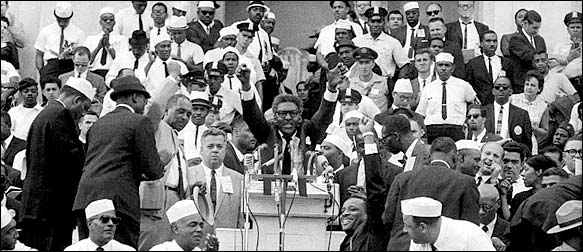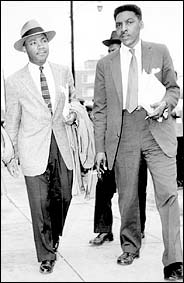| Want to send this page or a link to a friend? Click on mail at the top of this window. |
| Posted August 23, 2003 |
 |
Corbis/Bettman |
| Bayard Rustin, above, in a moment of triumph at the August 1963 March on Washington for Jobs and Freedom. |
| Hidden Sides, Hushed Ideals Of a Civil Rights Strategist |
| By PAUL BERMAN |
AT the 1963 March on Washington for Jobs and Freedom, the Rev. Dr. Martin Luther King Jr., proclaimed his dream of a future in which everyone, no matter who, would be able to cry: "Free at last! Free at last! Thank God almighty, we are free at last!"
Among King's followers, no one doubted what kind of freedom he had in mind. It was freedom from racist laws and the social customs of Jim Crow segregation — a legal and social freedom for millions of black Americans who, in the past, had never experienced anything of the sort.
But then something odd and unpredicted took place. Once the issue of freedom had been successfully raised, all kinds of people, black and nonblack, began to cast an inquisitive eye on laws and customs that had nothing to do with racism or Jim Crow, and began to identify other sorts of oppressions. The subsequent outpouring of fresh understandings and novel insights about rights and freedom — for gays, women, the disabled and more — has dominated American thinking for 40 years now, which is quite a long time. And among those many fresh understandings and insights has come a new retrospective understanding of the 1963 march itself.
 |
Associated Press |
| With the Rev. Dr. Martin Luther King Jr., Bayard Rustin, in 1956. |
The chief organizer of the Washington march was Bayard Rustin, who was duly applauded at the time for the efficiency of his labors. And yet, Rustin, who died in 1987 at 75, played a much larger role in organizing both the march and the wider civil rights movement than most people ever suspected at the time. Two new books, one a biography and the other a collection of Rustin's papers, now turn a brighter light on his life and his role, explaining how his homosexuality forced his contribution to be obscured.
Rustin was a Quaker and a pacifist, Gandhi style — which meant being a fighter, though without violence. By 1963, Rustin had been fighting a long time. In the 1940's, he worked as an assistant to A. Philip Randolph, the Harlem-based labor leader, and helped organize a campaign against racial discrimination in war-related jobs — a successful campaign, all in all, that played a role in integrating the armed forces, eventually. But for all his success at Randolph's side, Rustin did not glide from triumph to triumph.
In World War II he refused the draft, and in his pacifist zeal, refused even to accept a conscientious-objector status. Instead, he spent 28 months in federal prisons, a gruesome experience — though even there, unstoppable, he campaigned to end racial segregation in the prison dining hall. Released from jail, he went to work for a tiny pacifist organization in New York, which sent him around the country during the late 1940's and early 50's to agitate against war, against nuclear arms, against European imperialism in Africa and, always, against Jim Crow. He was arrested frequently. He was beaten. He served 28 days on a North Carolina chain gang.
But then, in December 1955, the black citizens of Montgomery, Ala., led by Dr. King, mounted a boycott of the city buses in protest against the Jim Crow seating rules. King was brilliant, and yet he was only 26 and did not always know what to do. But Bayard Rustin did. He went to Montgomery, met King, visited his home — and was dismayed to discover guns in the living room. Rustin spoke. King listened. Rustin was less than popular among some of the other leaders of the Montgomery boycott — was it his phony British accent? his monarchical air? — but King and the others dutifully put away their guns and agreed to be arrested in a Gandhian spirit of nonviolence and spiritual superiority, which was Rustin's advice, exactly.
| _______________________ |
| How gayness kept a civil rights leader in the shadows. |
_______________________ |
Rustin proposed a strategy of reaching out to black churches elsewhere in the South, to broaden the boycott's base of support. And he offered King a larger coalition still, which was organized by Randolph and the handful of New York pacifists. They called on friends and allies in the labor movement, on good-hearted politicians, on singers and actors and on wealthy liberals with money to donate. And so, the young King, from his pulpit in Alabama, found himself soon enough at the head of a fledgling national coalition. And the coalition grew until, by 1963, with 250,000 people attending the March on Washington for Jobs and Freedom, it proved to be a national power.
King was the leader of that gigantic coalition. But Rustin was the principal strategist.
Yet there was the question of Rustin's homosexuality, and his sometimes desperate promiscuity. On a couple of occasions he was arrested in parks, and in Pasadena, Calif., in 1953, for having sex with two men in a parked car, an incident that sent him back to jail for 60 days. The Pasadena arrest devastated his political career. Even his closest friends and comrades, some of them, turned on him with a real fury. That was why, during the Montgomery boycott, Rustin had to operate virtually as a secret agent, whispering his advice to King, and why, in Washington in 1963, he had to conceal the full extent of his leadership. He was all too vulnerable to political attacks, and there was nothing he could do about it.
John D'Emilio, in his new biography, "Lost Prophet: The Life and Times of Bayard Rustin" (Free Press), has provided the fullest description so far of the awful depth of Rustin's agony over these matters. It is heartbreaking to read about this — heartbreaking to recall that, in the 1950's and 60's, the question of sexual orientation could not even be broached in public except as an accusation. But today is a different age. And why is that?
It is because the civil rights campaign, in its glorious fecundity, did give birth to many newer inspirations, one of which turned out to be the modern movement for gay rights. The gay movement began to gather popular support in 1969, six years after the Washington march, and advanced somewhat slowly after that. Yet it did advance, and continues to advance, even in the conservative realms of the Supreme Court, which just this year struck down a Texas sodomy law — a huge event in the history of gay rights.
Mr. D'Emilio's book shows, in its frank and sympathetic discussion of Rustin's homosexuality, just how great the progress has been. The same forward step can be seen in the volume of Rustin's writings and interviews, "A Time on Two Crosses: The Collected Writings of Bayard Rustin" (Cleis Press), that has been assembled by Devon W. Carbado and Donald Weise. Here you can read the appreciative comments that Rustin himself began to make, during his last years in the 1980's, on the gay movement.
And so, in the new atmosphere today, Americans are finally able to see Rustin as he was — see him in his sexuality and in his sufferings, and see, as well, the monumental scale of his achievement. But does this mean that now, at last, the Washington march can be understood in full, with no more hidden aspects? The answer must be no, not really.
Thanks to the gay movement and to scholars like Mr. D'Emilio, it is possible today to speak about homosexuality with cool frankness. But it is not so easy to talk about a very different but equally pertinent theme, which is American socialism. Rustin was, after all, more than a pacifist.
His mentor A. Philip Randolph was one of the grand old men of American socialism, and Rustin followed in Randolph's footsteps, though with a Christian style of his own. Rustin as a young man briefly enrolled in the Young Communist League, but then withdrew and repudiated the Communist movement. Socialism, for both Rustin and Randolph, was a democratic idea, therefore an anti-Communist idea. It was an idea that had bubbled up from the the labor movement and had acquired its shape in the not-quite-Marxist political tradition of Eugene V. Debs. Rustin taught King some aspects of that idea — though King, loyal to his own Baptist background, kept away from the Old Left style that clung so naturally to Randolph and Rustin.
Even so, socialism figured as one element of the 1963 march, and not a small one, either. Why, after all, did the march call for "jobs" as well as "freedom"? The word jobs might sound today like political boilerplate, filling space and meaning nothing. But the word said, in effect, that securing rights was only half the program — that America's economy needed to be reorganized as well. In the first years after the march, when some of the main legislative goals of the civil rights movement congealed into federal law, Rustin came up with the idea, which he attributed to Randolph, of steering their carefully constructed national coalition in a new direction, toward the economic reorganization of society.
Rustin wrote an essay touching on this theme, "From Protest to Politics," which is included in the collection of his writings. He also wrote a sophisticated political program called "A Freedom Budget for All Americans," which unfortunately is not included.
But nothing came of the Freedom Budget. The giant civil rights coalition, instead of taking up the economic issue, fell into a thousand pieces in the later 1960's and 70's. Some people plunged into the new "identity" movements of those years. Others stayed loyal to the trade unions and were duly accused of having become "conservative." And the coalition was no more.
As for Rustin, he chose to be a union man under those circumstances, as could have been predicted. He spent the rest of his life advancing the legacy of Randolph in the AFL-CIO and working for the American Federation of Teachers — a job that caused him to be vilified in some quarters as a traitor to the left. Rustin was not a traitor, though — even if his writings show that from time to time he grew a little ornery and declined to grant even the slightest merit to his critics on the left. The problem was just that, by the 1970's, Rustin's language of economic democracy had become hard for other people to understand, even people on the left, which was precisely his complaint about them.
Today it can be said with only slight exaggeration that homosexuality has become a perfectly proper topic for public conversation, even with schoolchildren, while the very concept of a redistribution of wealth in America has somehow morphed into the great unmentionable.
Talk about ironies in the life of Bayard Rustin!
For even now, when the most painful of Rustin's secrets have come into the open, some last aspect of the March on Washington remains, in spite of everything, unremembered and undiscussed. It is the aspect that in 1963 went under the slogan "Jobs," which meant economic equality for all Americans — which is what people like Randolph and Rustin used to call, in an antique rhetoric that hardly anyone understands today, "socialism."
Paul Berman is the author of the book "Terror and Liberalism."
Copyright 2003 The New York Times Company. Reprinted from The New York Times, Arts & Ideas, of August 23, 2003.
| Wehaitians.com, the scholarly journal of democracy and human rights |
| More from wehaitians.com |